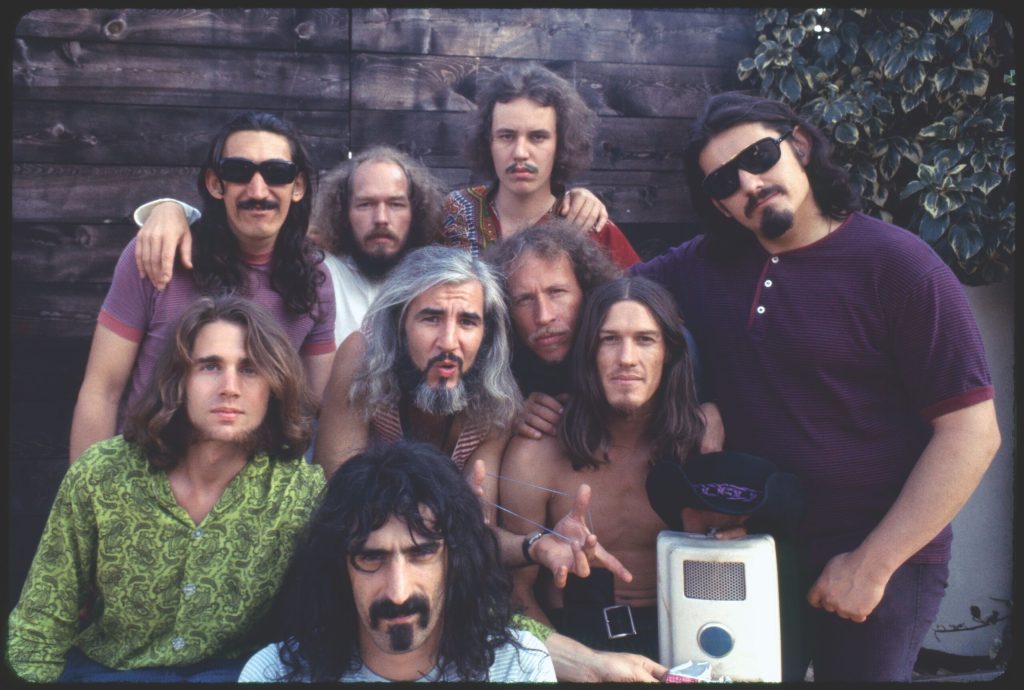
Frank Zappa acknowledges early into Whisky a Go Go, 1968 that using the concert setting at hand as a recording session was something new and unknown for the Mothers of Invention. He then quickly reminds himself of a failed attempt at making a live album from a show two months earlier at the Miami Pop Festival.
“That didn’t turn out too swift,” Zappa remarks. “I knew I was blocking that for a reason. We hope that this turns out a little bit better. It’s pretty hard to record what we do because it gets so loud and ugly.”
The nearly three hours that follow offers us yet another revelatory peak into Zappa’s unmatchable senses of performance and recording and how those worlds converge. Over 50 archival releases have fortified a vast artistic profile since Zappa’s death in 1993, the majority devoted to his ‘70s and ‘80s work. The most intriguing entries focused on an ambitious late ‘60s/early ‘70s run where the instrumental dynamics Zappa created in and out of the Mothers broadened immeasurably. That holds especially true for the Hot Rats/Waka Jawaka/The Grand Wazoo eras, which have been masterfully explored already through other boxed set excavations.
So far, though, Zappa’s music with the Mothers during the last half of the ‘60s, which mainstream eyes and ears once viewed as unapproachable and sometimes frightening rumblings from the West Coast underground, have been in short supply. But Whisky a Go Go, 1968 changes everything. It’s a raucous, daring carnival of a concert recording that represents the Mothers in action at the famed Sunset Blvd. club where Zappa and company set up shop on a Tuesday night – July 23 of 1968, to be exact – for a mammoth five-hour, three-set performance designed as a recording session.
The audiences turned out en masse, so much so that patrons lined up around the block were ushered in and out through the evening to make as many as possible part of the project. The band responded with a typically wild meshing of genre-jumping music bolstered by a performance feel that shifted from circus-like hysteria to jazz-savvy solemnity.
It all sat largely unused for 55 years until this latest release from the seemingly bottomless vault of Zappa recordings turned 2024 into 1968 again.
And it begins with a drum rampage. A five-hour performance/recording session and you start with Jimmy Carl Black and Art Tripp assaulting the skins? Horns are gradually peppered in like bicycle horns as the percussive frenzy soon yields to the introductory “Whisky Improvisation: Episode I.” The whole merry romp is something of a roll call, a gathering of Zappa’s troupes covering free improvisation, ensemble drive, spoken social parody and the sense the whole combustible mix will explode at any point. And it does. Again and again.
Playfulness is rampant when the music is and isn’t rolling, but the Mothers are no jokers. Few bands teetered between chaotic horse play and wildly focused compositional and improvisational daring as this early Mothers lineup did. Sure, bassist Ray Estrada’s falsetto shrill on the doo-wop drenched “Oh, in the Sky” might seem like a joke. But he, Zappa and the rest of the band reveal a total reverence for the genre despite the rough immediacy that dominates much of the album (the next Mothers’ studio record, the doo-wop concept piece Cruising with Ruben and the Jets, would surface just five months after the Whisky performance).

Photo by George Rodriguez.
How out of bounds does this soiree get? Let’s start with “Whisky Improvisation: Episode II,” another drum interlude that leads into a wordless vocal onslaught that approximates vocal hurling (the kind usually experienced after a bad meal) prior to the two-minute jazz atonality of “Meow.” All of that leaps into a mockingly jingoistic sendup of “God Bless America” and, eventually, a revised reading of another Zappa social standing anthem “Plastic People” sung to the tune of “Louie, Louie.”
A similar juxtaposition erupts when an additional Mothers snapshot of the Great Society, “Hungry Freaks, Daddy,” plays out as a tambourine/keyboard-dominate party piece before a switch is slipped and the band launches alertly into “King Kong.” The then-new jazz fusion workout remains a definitive Zappa instrumental work to this day. It’s a masterful display of how disarming the onstage hijinks can seem before Zappa tightens the music into a driving and thoroughly arresting jam. The same feel ensues when the aforementioned “Plastic People”/“Louie Louie” mash-up leads into two takes of “The Duke.” Both showcase solos for various Mothers members – particularly Estrada and sax men Ian Underwood, Bunk Gardner and Motorhead Sherman – that lead into the ensemble merriment of “Khaki Shack.”
Fans accustomed to the extended guitar exploits that grew more dominate throughout Zappa’s music in ensuing years might be slightly dismayed by the comparative modesty in spotlight time the bandleader takes here as an instrumentalist. Oh, you still experience a wealth of his playing, but it’s more integrated into the ensemble music. As such, guitar solos that wind their way through “Khaki Sack,” “The Whip” and “Whisky Chouflee” – a collective 30-plus minute instrumental joyride near Whisky a Go Go, 1968’s conclusion – serve more as colors and, at times, catalysts for the Mothers’ overall blend of jazz, jams, and boogie.
“Gee, boys and girls, it sure has been fun having you over to our teenage recording session,” Zappa announces after a loose-fitting jam bursting out of the impossible changes of tempo and temperament that fuel “Brown Shoes Don’t Make It” bring Whisky a Go Go, 1968 to the finish line.
Over a half-century later, with the party’s sense of abandon and adventure now revealed in full, all of the “loud and ugly” fun is truly ours.